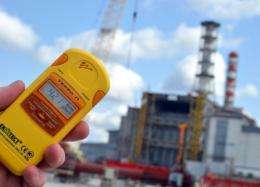Dosimeter in front of the shelter over the destroyed fourth block of Ukraine's Chernobyl Power Plant on the 26th anniversary of the nuclear disaster. The EU's energy chief deemed an almost year-long study on nuclear plant safety in Europe as short on detail and numbers and demanded further work before publication of the critical report.
The EU's energy chief Thursday deemed an almost year-long study on nuclear plant safety in Europe as short on detail and numbers and demanded further work before publication of the critical report.
"Going deep is more important than being fast," Commissioner Guenther Oettinger told journalists, saying that a final report would be available to the public in the autumn rather than in the summer, as scheduled.
Ordered in the aftermath of the Fukushima catastrophe, the European Commission and national atomic regulators launched stress tests in June on 147 nuclear plants in 15 EU countries -- including Lithuania which has closed down plants -- plus 15 reactors in Ukraine and five in Switzerland.
The reactors include those in Germany currently being decommissioned.
After tough talks, EU nuclear regulators agreed tests on the ability of reactors to survive earthquakes, floods or man-made events like plane crashes.
Oettinger said he had agreed with the European Nuclear Safety Regulators Group (ENSREG) to have more plants visited and to add more concrete information on the potential impact of airplane crashes.
"We will do additional visits of power plants and analyse some safety aspects in more detail," Oettinger said.
"EU citizens have the right to know and understand how safe the nuclear power plants are they live close to."
(c) 2012 AFP
























